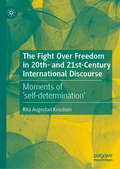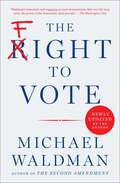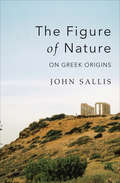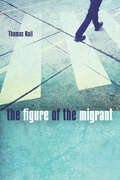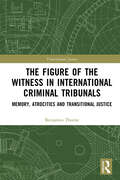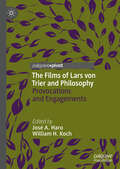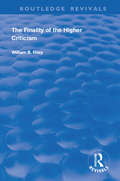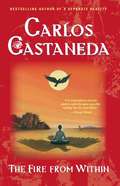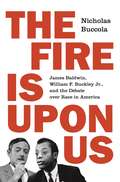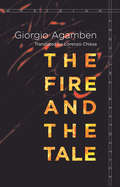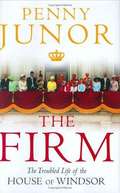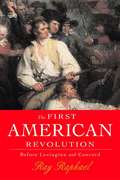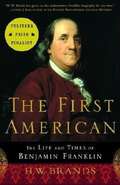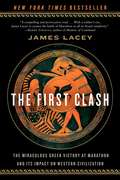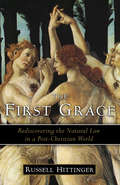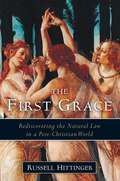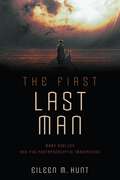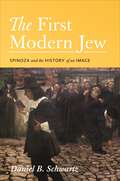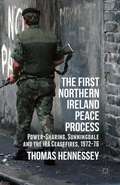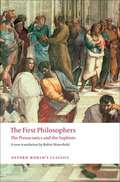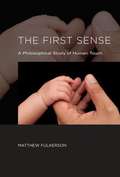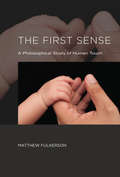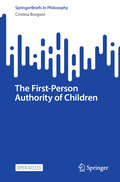- Table View
- List View
The Fight Over Freedom in 20th- and 21st-Century International Discourse: Moments of ‘self-determination’
by Rita Augestad KnudsenThis book shows how international discourse citing ‘self-determination’ over the last hundred years has functioned as a battleground between two ideas of freedom: a ‘radical’ idea of freedom, and a ‘liberal-conservative’ idea of freedom. The book examines each of the major moments in which ‘self-determination’ has been a central part of the language of high-level international politics and law: the early 20th century discourse of V.I. Lenin and U.S. President Woodrow Wilson, the aftermath of the First World War and the formulation of the UN Charter, the 1950-1960s UN debates on ‘self-determination’, and the 2008-2010 International Court of Justice case on Kosovo’s declaration of independence. At each of these moments in history, ‘self-determination’ was at the top of the international agenda. And at each moment, a fight over the meaning of freedom played out in ‘self-determination’ discourse. Besides providing insights into the historical times in which self-determination was prominently cited internationally, the book offers a recasting and renewal of international debates on freedom in international discourse.
The Fight to Vote
by Michael WaldmanPraised by the late John Lewis, this is the seminal book about the long and ongoing struggle to win voting rights for all citizens by the president of The Brennan Center, the leading organization on voter rights and election security, now newly revised to describe today&’s intense fights over voting.As Rep. Lewis said, and recent events in state legislatures across the country demonstrate, the struggle for the right to vote is not over. In this &“important and powerful&” (Linda Greenhouse, former New York Times Supreme Court correspondent) book Michael Waldman describes the long struggle to extend the right to vote to all Americans. From the writing of the Constitution, and at every step along the way, as disenfranchised Americans sought this right, others have fought to stop them. Waldman traces this history from the Founders&’ debates to today&’s many restrictions: gerrymandering; voter ID laws; the flood of dark money released by conservative organizations; and the concerted effort in many state legislatures after the 2020 election to enact new limitations on voting. Despite the pandemic, the 2020 election had the highest turnout since 1900. In this updated edition, Waldman describes the nationwide effort that made this possible. He offers new insights into how Donald Trump&’s false claims of fraud—&“the Big Lie&”—led to the January 6 insurrection and the fights over voting laws that followed one of the most dramatic chapters in the story of American democracy. As Waldman shows, this fight, sometimes vicious, has always been at the center of American politics because it determines the outcome of the struggle for power. The Fight to Vote is &“an engaging, concise history…offering many useful reforms that advocates on both sides of the aisle should consider&” (The Wall Street Journal).
The Figure of Nature: On Greek Origins (Studies in Continental Thought)
by John SallisOne of America&’s preeminent philosophers &“has produced a book with fascinating new insights into the ancient conception of nature&” (Choice). Broaching an understanding of nature in Platonic thought, John Sallis goes beyond modern conceptions and provides a strategy to have recourse to the profound sense of nature operative in ancient Greek philosophy. In a rigorous and textually based account, Sallis traces the complex development of the Greek concept of nature. Beginning with the mythical vision embodied in the figure of the goddess Artemis, he reanimates the sense of nature that informs the fragmentary discourses of Anaximenes, Heraclitus, Parmenides, and Empedocles and shows how Plato takes up pre-Socratic conceptions critically while also being transformed. Through Sallis&’s close reading of the Theaetetus and the Phaedo, he recovers the profound and comprehensive concept of nature in Plato&’s thought.
The Figure of the Migrant
by Thomas NailThis book offers a much-needed new political theory of an old phenomenon. The last decade alone has marked the highest number of migrations in recorded history. Constrained by environmental, economic, and political instability, scores of people are on the move. But other sorts of changes--from global tourism to undocumented labor--have led to the fact that to some extent, we are all becoming migrants. The migrant has become the political figure of our time. Rather than viewing migration as the exception to the rule of political fixity and citizenship, Thomas Nail reinterprets the history of political power from the perspective of the movement that defines the migrant in the first place. Applying his "kinopolitics" to several major historical conditions (territorial, political, juridical, and economic) and figures of migration (the nomad, the barbarian, the vagabond, and the proletariat), he provides fresh tools for the analysis of contemporary migration.
The Figure of the Witness in International Criminal Tribunals: Memory, Atrocities and Transitional Justice
by Benjamin ThorneThis book analyses how international criminal institutions, and their actors – legal counsels, judges, investigators, registrars – construct witness identity and memory. Filling an important gap within transitional justice scholarship, this conceptually led and empirically grounded interdisciplinary study takes the International Criminal Tribunal for Rwanda (ICTR) as a case study. It asks: How do legal witnesses of human rights violations contribute to memory production in transitional post-conflict societies? Witnessing at tribunals entails individuals externalising memories of violations. This is commonly construed within the transitional justice legal scholarship as an opportunity for individuals to ensure their memories are entered into an historical record. Yet this predominant understanding of witness testimony fails to comprehend the nature of memory. Memory construction entails fragments of individual and collective memories within a contestable and contingent framing of the past. Accordingly, the book challenges the claim that international criminal courts and tribunals are able to produce a collective memory of atrocities; as it maintains that witnessing must be understood as a contingent and multi-layered discursive process. Contributing to the specific analysis of witnessing and memory, but also to the broader field of transitional justice, this book will appeal to scholars and practitioners in these areas, as well as others in legal theory, global criminology, memory studies, international relations, and international human rights.
The Films of Lars von Trier and Philosophy: Provocations and Engagements
by José A. Haro William H. KochThe films of Lars von Trier offer unique opportunities for thinking deeply about how Philosophy and Cinema speak to one another. The book addresses von Trier’s films in order of their release. The earlier chapters discuss his Golden Heart trilogy and USA: Land of Opportunities series by addressing issues of potential misogyny, ethical critique, and racial justice. The later chapters focus on his Depression Trilogy and address the undermining of gender binaries, the psychoanalytic meaning of the sacrifice of children and depression, and philosophical questions provoked by the depiction of the end of the world. Taken together, the volume explores the topics of Philosophical Psychology, Social Theory, Political Theory, Theories of the Self, Philosophy of Race, and Feminist Thought, and opens a conversation about von Trier’s important work.
The Finality of the Higher Criticism: Or, The Theory of Evolultion and False Theology (Routledge Revivals)
by W. B. RileyFirst published in 1988, this volume was originally published, according to the authors, thanks to a ‘conscious call’. They were ‘fully persuaded that the honor of Christ and the very life of His church are alike endangered by the doubting spirit now brooding over the educational institutions of America.’ The book contains chapters on the prominence of scepticism in schools; the theory of evolution and false theology; and the sacred scriptures.
The Fire From Within
by Carlos CastanedaFire from Within is the author's most brilliant thought-provoking and unusual book, one in which Castaneda, under the tutelage of don Juan and his "disciples," at last constructs, from the teachings of don Juan and his own experiences, a stunning portrait of the "sorcerer's world" that is crystal-clear and dizzying in its implications. Each of Carlos Castaneda's books is a brilliant and tantalizing burst of illumination into the depths of our deepest mysteries, like a sudden flash of light, like a burst of lightning over the desert at night, which shows us a world that is both alien and totally familiar -- the landscape of our dreams.
The Fire Is upon Us: James Baldwin, William F. Buckley Jr., and the Debate over Race in America
by Nicholas BuccolaHow the clash between the civil rights firebrand and the father of modern conservatism continues to illuminate America's racial divideOn February 18, 1965, an overflowing crowd packed the Cambridge Union in Cambridge, England, to witness a historic televised debate between James Baldwin, the leading literary voice of the civil rights movement, and William F. Buckley Jr., a fierce critic of the movement and America's most influential conservative intellectual. The topic was "the American dream is at the expense of the American Negro," and no one who has seen the debate can soon forget it. Nicholas Buccola's The Fire Is upon Us is the first book to tell the full story of the event, the radically different paths that led Baldwin and Buckley to it, the controversies that followed, and how the debate and the decades-long clash between the men continues to illuminate America's racial divide today.Born in New York City only fifteen months apart, the Harlem-raised Baldwin and the privileged Buckley could not have been more different, but they both rose to the height of American intellectual life during the civil rights movement. By the time they met in Cambridge, Buckley was determined to sound the alarm about a man he considered an "eloquent menace." For his part, Baldwin viewed Buckley as a deluded reactionary whose popularity revealed the sickness of the American soul. The stage was set for an epic confrontation that pitted Baldwin's call for a moral revolution in race relations against Buckley's unabashed elitism and implicit commitment to white supremacy.A remarkable story of race and the American dream, The Fire Is upon Us reveals the deep roots and lasting legacy of a conflict that continues to haunt our politics.
The Fire and the Tale
by Giorgio Agamben Lorenzo ChiesaWhat is at stake in literature? Can we identify the fire that our stories have lost, but that they strive, at all costs, to rediscover? And what is the philosopher's stone that writers, with the passion of alchemists, struggle to forge in their word furnaces? For Giorgio Agamben, who suggests that the parable is the secret model of all narrative, every act of creation tenaciously resists creation, thereby giving each work its strength and grace. The ten essays brought together here cover works by figures ranging from Aristotle to Paul Klee and illustrate what urgently drives Agamben's current research. As is often the case with his writings, their especial focus is the mystery of literature, of reading and writing, and of language as a laboratory for conceiving an ethico-political perspective that places us beyond sovereign power.
The Firm: The Troubled Life of the House of Windsor
by Penny JunorHowever you look at it, the royal family is a big business, though one with more ups and downs than the stock market. Prince Philip calls it "The Firm," and all the royal executives and their powerful associates are supposed to make every effort to avoid even a hint of scandal that could diminish the reputation of the family business.
The First American Revolution: Before Lexington and Concord
by Ray RaphaelThe famous Shot Heard Round the World in April 1775 was not the beginning of the armed struggle for independence, says popular historian Raphael. The British were at that point trying to regain the authority that thousands of artisans and farmers had seized from every Crown-appointed official in Massachusetts outside Boston the previous summer. Annotation c. Book News, Inc. , Portland, OR (booknews. com)
The First American: The Life and Times of Benjamin Franklin
by H. W. BrandsPULITZER PRIZE FINALIST • Benjamin Franklin, perhaps the pivotal figure in colonial and revolutionary America, comes vividly to life in this &“thorough biography of ... America&’s first Renaissance man&” (The Washington Post) by the two-time Pulitzer Prize finalist, bestselling historian, and author of Our First Civil War."The authoritative Franklin biography for our time.&” —Joseph J. Ellis, author of the Pulitzer Prize-winning Founding BrothersWit, diplomat, scientist, philosopher, businessman, inventor, and bon vivant, Benjamin Franklin's "life is one every American should know well, and it has not been told better than by Mr. Brands" (The Dallas Morning News). From penniless runaway to highly successful printer, from ardently loyal subject of Britain to architect of an alliance with France that ensured America&’s independence, Franklin went from obscurity to become one of the world&’s most admired figures, whose circle included the likes of Voltaire, Hume, Burke, and Kant.Drawing on previously unpublished letters and a host of other sources, acclaimed historian H. W. Brands has written a thoroughly engaging biography of the eighteenth-century genius. A much needed reminder of Franklin&’s greatness and humanity, The First American is a work of meticulous scholarship that provides a magnificent tour of a legendary historical figure, a vital era in American life, and the countless arenas in which the protean Franklin left his legacy.Look for H.W. Brands's other biographies: ANDREW JACKSON, THE MAN WHO SAVED THE UNION (Ulysses S. Grant), TRAITOR TO HIS CLASS (Franklin Roosevelt) and REAGAN.
The First Breath
by Icarus Phaethon"Everyone's life is a mountain. You can spend your whole time wandering around the lowlands and foothills of this great peak, but unless you make the commitment to get to the top one day, you will never find out who you really are." The First Breath is an astounding work that is a mix of travel narrative, philosophical dialogue, human drama, intrigue, love story and soul-searching personal journey. It will challenge your perception of the world and relationship with it. There's something terribly wrong with the world, at least Icarus thinks so. Something's not quite right and it's something he can't quite put his finger on. It's akin to that fleeting moment when you think of a rose then you actually see one, and can't quite figure out whether it's just a coincidence or something much stranger, deeper and far reaching than you could ever imagine.
The First Clash: The Miraculous Greek Victory at Marathon--and Its Impact on Western Civilization
by Jim LaceyMarathon--one of history's most pivotal battles. Its very name evokes images of almost superhuman courage, endurance, and fighting spirit. But until now, the story of what happened at Marathon has been told exclusively through the narrow viewpoint of specialists in antiquity. In this eye-opening new book, acclaimed journalist Jim Lacey, both a military historian and a combat veteran, takes a fresh look at Marathon and reveals why the battle happened, how it was fought, and whether, in fact, it saved Western civilization. Lacey brilliantly reconstructs the world of the fifth century B.C. leading up to the astonishing military defeat of the Persian Empire by the vastly undermanned but determined Greek defenders. Using the seminal work of Herodotus as his starting point, Lacey reconstructs the tactical and strategic scenario of the battle, including how many combatants each side might have used and who actually led the Greeks. He also disputes the long-repeated myths of Athenian inexperience and effete Persian arrogance. With the kind of vivid detail that characterizes the best modern war reportage, Lacey shows how the heavily armed Persian army was shocked, demoralized, and ultimately defeated by the relentless assault of the Athenian phalanx, which battered the Persian line in a series of brutal attacks. He reveals the fascinating aftermath of Marathon, how its fighters became the equivalent of our "Greatest Generation," and challenges the view of many historians that Marathon ultimately proved the Greek "Western way of war" to be the superior strategy for fighting--and winning--battles to the present day. Immediate, visceral, and full of new analyses that defy decades of conventional wisdom, The First Clash is a superb interpretation of a conflict that indeed made the world safe for Aristotle, Plato, and our own modern democracy. But it was also a battle whose legacy and lessons have often been misunderstood--perhaps, now more than ever, at our own peril.
The First French Reformation
by Tyler LangeThe political culture of absolute monarchy that structured French society into the eighteenth century is generally believed to have emerged late in the sixteenth century. This new interpretation of the origins of French absolutism, however, connects the fifteenth-century conciliar reform movement in the Catholic Church to the practice of absolutism by demonstrating that the monarchy appropriated political models derived from canon law. Tyler Lange reveals how the reform of the Church offered a crucial motive and pretext for a definitive shift in the practice and conception of monarchy, and explains how this First French Reformation enabled Francis I and subsequent monarchs to use the Gallican Church as a useful deposit of funds and judicial power. In so doing, the book identifies the theoretical origins of later absolutism and the structural reasons for the failure of French Protestantism.
The First Grace: Rediscovering the Natural Law in a Post-Christian World
by Russell HittingerIn the book’s first section, Hittinger defines the natural law, considers its proper relationship to moral theology and the positive law, and explains how and when judges should be guided by natural law considerations. Then, in the book’s second section, he contends with a number of controversial legal and cultural issues from a natural law perspective. Among other things, he shows how the modern propensity to make all sorts of “rights claims” undermines the idea of limited government; how the liberal legal culture’s idea of privacy elevates the individual to the status of a sovereign; and how the Supreme Court has come to cast religion as a dangerous phenomenon from which children must be protected.Whether discussing the nature of liberalism, the constitutional and moral problems posed by judicial usurpation, or the dangers of technology, Hittinger convincingly demonstrates that in our post-Christian world it is more crucial than ever that we recover older, wiser notions of the concepts of freedom and law—since to oppose them is to misunderstand both profoundly.
The First Grace: Rediscovering the Natural Law in a Post-Christian World
by Russell HittingerThe last two decades or so have seen a marked resurgence of interest in natural law thought, a movement in which Russell Hittinger has been a major figure. The First Grace: Rediscovering the Natural Law in a Post-Christian World reveals the power and subtlety of Hittinger's philosophical work and cultural criticism. Whether discussing the nature of liberalism, the constitutional and moral problems posed by judicial usurpation, or the dangers of technology, Hittinger convincingly demonstrates that in our post-Christian world it is more crucial than ever that we recover older, wiser notions of the concepts of freedom and law - and that we see that to place these two concepts in opposition is to misunderstand both profoundly.
The First Last Man: Mary Shelley and the Postapocalyptic Imagination
by Eileen M. HuntBeyond her most famous creation—the nightmarish vision of Frankenstein’s Creature—Mary Shelley’s most enduring influence on politics, literature, and art perhaps stems from the legacy of her lesser-known novel about the near-extinction of the human species through war, disease, and corruption. This novel, The Last Man (1826), gives us the iconic image of a heroic survivor who narrates the history of an apocalyptic disaster in order to save humanity—if not as a species, then at least as the practice of compassion or humaneness. In visual and musical arts from 1826 to the present, this postapocalyptic figure has transmogrified from the “last man” into the globally familiar filmic images of the “invisible man” and the “final girl.”Reading Shelley’s work against the background of epidemic literature and political thought from ancient Greece to Covid-19, Eileen M. Hunt reveals how Shelley’s postapocalyptic imagination has shaped science fiction and dystopian writing from H. G. Wells, M. P. Shiel, and George Orwell to Octavia Butler, Margaret Atwood, and Emily St. John Mandel. Through archival research into Shelley’s personal journals and other writings, Hunt unearths Shelley’s ruminations on her own personal experiences of loss, including the death of young children in her family to disease and the drowning of her husband, Percy Bysshe Shelley. Shelley’s grief drove her to intensive study of Greek tragedy, through which she developed the thinking about plague, conflict, and collective responsibility that later emerges in her fiction. From her readings of classic works of plague literature to her own translation of Sophocles’s Oedipus Rex, and from her authorship of the first major modern pandemic novel to her continued influence on contemporary popular culture, Shelley gave rise to a tradition of postapocalyptic thought that asks a question that the Covid-19 pandemic has made newly urgent for many: What do humans do after disaster?
The First Modern Jew: Spinoza and the History of an Image
by Daniel B. SchwartzPioneering biblical critic, theorist of democracy, and legendary conflater of God and nature, Jewish philosopher Baruch Spinoza (1632-1677) was excommunicated by the Sephardic Jews of Amsterdam in 1656 for his "horrible heresies" and "monstrous deeds." Yet, over the past three centuries, Spinoza's rupture with traditional Jewish beliefs and practices has elevated him to a prominent place in genealogies of Jewish modernity. The First Modern Jew provides a riveting look at how Spinoza went from being one of Judaism's most notorious outcasts to one of its most celebrated, if still highly controversial, cultural icons, and a powerful and protean symbol of the first modern secular Jew. Ranging from Amsterdam to Palestine and back again to Europe, the book chronicles Spinoza's posthumous odyssey from marginalized heretic to hero, the exemplar of a whole host of Jewish identities, including cosmopolitan, nationalist, reformist, and rejectionist. Daniel Schwartz shows that in fashioning Spinoza into "the first modern Jew," generations of Jewish intellectuals--German liberals, East European maskilim, secular Zionists, and Yiddishists--have projected their own dilemmas of identity onto him, reshaping the Amsterdam thinker in their own image. The many afterlives of Spinoza are a kind of looking glass into the struggles of Jewish writers over where to draw the boundaries of Jewishness and whether a secular Jewish identity is indeed possible. Cumulatively, these afterlives offer a kaleidoscopic view of modern Jewish cultureand a vivid history of an obsession with Spinoza that continues to this day.
The First Northern Ireland Peace Process: Power-Sharing, Sunningdale and the IRA Ceasefires 1972-76
by Thomas HennesseyThe First Northern Ireland Peace Process covers the various attempts to end the 'Troubles' from 1972-76. These attempts included secret talks with the Provisional IRA and a parallel process to build a political consensus between the British and Irish Governments and the main constitutional parties in Northern Ireland.
The First Philosophers: The Presocratics and Sophists (Oxford World's Classics)
by Robin WaterfieldAristotle said that philosophy begins with wonder, and the first Western philosophers developed theories of the world which express simultaneously their sense of wonder and their intuition that the world should be comprehensible. But their enterprise was by no means limited to this proto-scientific task. Through, for instance, Heraclitus' enigmatic sayings, the poetry of Parmenides and Empedocles, and Zeno's paradoxes, the Western world was introduced to metaphysics, rationalist theology, ethics, and logic, by thinkers who often seem to be mystics or shamans as much as philosophers or scientists in the modern mould. And out of the Sophists' reflections on human beings and their place in the world arose and interest in language, and in political, moral, and social philosophy. This volume contains a translation of all the most important fragments of the Presocratics and Sophists, and of the most informative testimonia from ancient sources, supplemented by lucid commentary. About the Series: For over 100 years Oxford World's Classics has made available the broadest spectrum of literature from around the globe. Each affordable volume reflects Oxford's commitment to scholarship, providing the most accurate text plus a wealth of other valuable features, including expert introductions by leading authorities, voluminous notes to clarify the text, up-to-date bibliographies for further study, and much more.
The First Sense
by Matthew FulkersonIt is through touch that we are able to interact directly with the world; it is our primary conduit of both pleasure and pain. Touch may be our most immediate and powerful sense -- "the first sense" because of the central role it plays in experience. In this book, Matthew Fulkerson proposes that human touch, despite its functional diversity, is a single, unified sensory modality. Fulkerson offers a philosophical account of touch, reflecting the interests, methods, and approach that define contemporary philosophy; but his argument is informed throughout by the insights and constraints of empirical work on touch. Human touch is a multidimensional object of investigation, Fulkerson writes, best served by using a variety of methods and approaches. To defend his view of the unity of touch, Fulkerson describes and argues for a novel, unifying role for exploratory action in touch. He goes on to fill in the details of this unified, exploratory form of perception, offering philosophical accounts of tool use and distal touch, the representational structure of tangible properties, the spatial content of touch, and the role of pleasure in tactual experience. Fulkerson's argument for the unique role played by exploratory action departs notably from traditional vision-centric philosophical approaches to perception, challenging the received view that action plays the same role in all sensory modalities. The robust philosophical account of touch he offers in The First Sense has significant implications for our general understanding of perception and perceptual experience.
The First Sense: A Philosophical Study of Human Touch (The\mit Press Ser.)
by Matthew FulkersonAn empirically informed philosophical account of human touch as a single, unified sensory modality that plays a central role in perception. It is through touch that we are able to interact directly with the world; it is our primary conduit of both pleasure and pain. Touch may be our most immediate and powerful sense—“the first sense” because of the central role it plays in experience. In this book, Matthew Fulkerson proposes that human touch, despite its functional diversity, is a single, unified sensory modality. Fulkerson offers a philosophical account of touch, reflecting the interests, methods, and approach that define contemporary philosophy; but his argument is informed throughout by the insights and constraints of empirical work on touch. Human touch is a multidimensional object of investigation, Fulkerson writes, best served by using a variety of methods and approaches.To defend his view of the unity of touch, Fulkerson describes and argues for a novel, unifying role for exploratory action in touch. He goes on to fill in the details of this unified, exploratory form of perception, offering philosophical accounts of tool use and distal touch, the representational structure of tangible properties, the spatial content of touch, and the role of pleasure in tactual experience. Fulkerson's argument for the unique role played by exploratory action departs notably from traditional vision-centric philosophical approaches to perception, challenging the received view that action plays the same role in all sensory modalities. The robust philosophical account of touch he offers in The First Sense has significant implications for our general understanding of perception and perceptual experience.
The First-Person Authority of Children (SpringerBriefs in Philosophy)
by Cristina BorgoniThis is an open access book that addresses how we treat others and, in particular, infants and children, with first-person authority. We respond to people’s first-person authority when we give our interlocutor’s communication of their mental states more significance in establishing their thoughts, desires, and feelings than if another person were to report those mental states for them. But what happens when our interlocutors are infants and children? Increasingly, practices of responsive childrearing ascribe first-person authority to very young children. Despite this tendency, philosophy seems to be one step behind. The accepted view is one in which first-person authority has its locus in linguistic expressions of one’s self-knowledge. This is an over-intellectualized conception, however, that consequently tends to exclude children. By combining philosophical resources with empirical findings about the onset of human communication, play, and our nature as social beings, this text advances a non-intellectualized, anti-individualist, and non-adult-centered view of first-person authority. This is a view that both accommodates our daily experiences and provides material for advancing the philosophical debate around the phenomenon in an enriched and more inclusive way.
